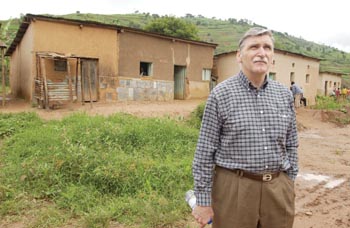![[Metroactive Movies]](/movies/gifs/movies468.gif)
[ Movies Index | Show Times | Silicon Valley | Metroactive Home | Archives ]
Blue Beret Ballad
Peter Raymont's documentary 'Shake Hands With the Devil' tells the real story of Gen. Roméo Dallaire
By Richard von Busack
THE MOST bullshit part of Hotel Rwanda (now on DVD) is the performance of Nick Nolte as a character based on Roméo Dallaire, the Canadian general in charge of the U.N. mission to Rwanda in 1994. Evincing white guilt for the world's inaction, Nolte went in for the ultramelodrama he can succumb to from time to time.
In Shake Hands With the Devil: The Journey of Roméo Dallaire, the real-life Dallaire explains his own culpability, without calling a black bartender "nigger," as Nolte does. The documentary surpasses the better-known Oscar-nominated succès d'estime as an account of the ethnic cleansing and its lingering effects on Dallaire.
The film tells the story of the U.N. soldier officer, who was assigned to keep the peace in Rwanda during the massacres of hundreds of thousands of Tutsis in 1994. Returning in 2004 for ceremonies held to commemorate the genocide, the general seeks both penance and understanding.
On the surface, Dallaire and his wife, Elizabeth, are no different from many middle-aged snowbirds. Both are inoffensively placid, understated; both evince a Quebec drawl in their speech. (It was the Canadian in Dallaire that made him answer a reporter's question in 1994 like so: "If you stated all hell was breaking loose in Kilgali, eh, that would be a reasonably fair statement.")
In news footage, the younger Gen. Dallaire is seen, his bellicose mustache bristling, clutching a cigar stub in a jaw worthy of C. Aubrey Smith. In those days, 10 years ago, Médicins Sans Frontières' Dr. James Orbinski recalls Dallaire's "booming voice." So, it's difficult to identify the slow, quiet man with the officer he was. Dellaire grew so mild-mannered, we even see him barred by the security guard at the U.N. compound he defended, because no one instantly recognized him.
It figures. Dallaire had been dropped into the cauldron without briefing. On hearing that he was to be assigned to Rwanda, Gen. Dallaire recalls telling his wife, "That's in Africa, isn't it?" Matters didn't get much better from there. As the bleak joke goes, the U.N.'s response to Rwanda was UNderfunded, UNderstaffed and UNready. Dallaire's commanders were neither ready to pull out the troops nor ready to reinforce them. Seeing firsthand the slow abandonment of Rwanda by the West, Dallaire did his best to try to keep the media interested in the Hutus' genocide. Unfortunately, the O.J. Simpson trial proved just too intoxicating.
After his season in Africa, Dallaire went through 10 years of post-traumatic agony, including a public-drunkenness arrest and two suicide attempts. Eventually, he wrote his memoir, the book Shake Hands With the Devil. The visit to Rwanda is far from healing, though. Dallaire is accosted by an angry Belgian senator, and he makes an unsparing personal apology at the University of Rwanda for the U.N.'s failure.
In making the slaughter in Rwanda a story of the triumph of the human spirit, Hotel Rwanda could be summed up by Jean-Luc Godard's comment in Notre Musique: "Everyone talks about the key to a problem—no one talks about the lock." Director Peter Raymont indeed "talks about the lock." Shake Hands With the Devil includes black-and-white newsreels of crackpot white phrenologists measuring the heads and eyes of the Hutus, to prove their own superiority as the Belgian colonists' designated master-race. And in a 1994 telecast, the general makes a reminder to the Belgians. Fifty years before, he says, Dallaire's own father had been fighting the Nazis to free Belgium even as that nation's colonists still had their noses in the African feedbag. Dallaire is also scathing about the Rwanda Catholic churches, which refused to intercede when their parishioners were murdering one another.
The general remains a controversial figure, blamed by some of the widows of some 10 Belgian soldiers for not rescuing their mob-killed husbands. Some of Dallaire's partisans defend the general, whose commitment to Rwanda continues. Touring the nation—misty, mountainous and green as up-country Maui—he imposes his own story on what happened: "Paradise was assaulted by the devil."
Raymont reaches for an equally easy summing-up. At the beginning of Shake Hands With the Devil, a title card claims Dallaire was "condemned to peer into the heart of darkness." Peering into my copy of the Joseph Conrad novel, I found the matchless passage where Marlow reads Mr. Kurtz's essay on how to tame Africa.
Kurtz's piece is full of glowing words, as befits a man who has Western civilization behind him: "All Europe made Kurtz," Conrad writes. In his scheme, Kurtz sounds the high note for Africa's future: "the notion of an exotic Immensity ruled by an august Benevolence." Famously, Kurtz's essay finishes with the scribbled afterthought: "Exterminate all of the brutes."
The passage from Heart of Darkness reflects both the U.N.'s loftiness and its ultimate indifference in letting "the brutes" exterminate themselves. Where is the heart of darkness, then?—in Rwanda, or in New York?
[ Silicon Valley | Metroactive Home | Archives ]
![]()

Beyond White Guilt: Gen. Roméo Dallaire tried to stem the tide of terror in Rwanda.
Shake Hands With the Devil (Unrated; 91 min.), a documentary by Peter Raymont, opens in late July.
Send a letter to the editor about this story to letters@metronews.com.
From the June 22-28, 2005 issue of Metro, Silicon Valley's Weekly Newspaper.